
The Council of the European Union, often referred to in the treaties and other official documents simply as the Council, and informally known as the Council of Ministers, is the third of the seven Institutions of the European Union (EU) as listed in the Treaty on European Union. It is one of two legislative bodies and together with the European Parliament serves to amend and approve, or veto, the proposals of the European Commission, which holds the right of initiative.

The European Council is a collegiate body that defines the overall political direction and priorities of the European Union. The European Council is part of the executive of the European Union (EU), beside the European Commission. It is composed of the heads of state or of government of the EU member states, the President of the European Council, and the President of the European Commission. The High Representative of the Union for Foreign Affairs and Security Policy also takes part in its meetings.
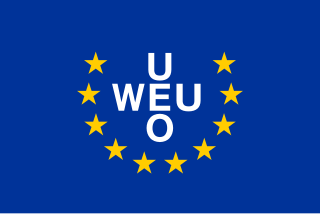
The Western European Union was the international organisation and military alliance that succeeded the Western Union (WU) after the 1954 amendment of the 1948 Treaty of Brussels. The WEU implemented the Modified Brussels Treaty. During the Cold War, the Western Bloc included the WEU member-states, plus the United States and Canada, as part of the North Atlantic Treaty Organization (NATO).
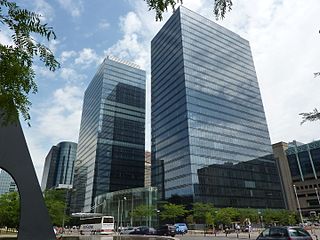
The economy of Belgium is a highly developed, high-income, mixed economy.
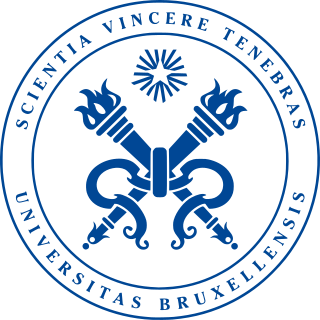
The Université libre de Bruxelles is a French-speaking research university in Brussels, Belgium. It has three campuses: the Solbosch campus, the Plaine campus and the Erasmus campus.
A European School is a type of international school emphasising a multilingual and multicultural pedagogical approach to the teaching of nursery, primary and secondary students, leading to the European Baccalaureate as their secondary leaving qualification. Each European School is set up, financed, and operated by the international organisation, the "European Schools", controlled jointly by the member states of the European Union and the European Commission. The schools prioritise, for enrolment purposes, the children of EU staff.

The College of Europe is a post-graduate institute of European studies with its first campus opened in Bruges, Belgium, a second campus located in Warsaw, Poland, and a third one established in Tirana, Albania.
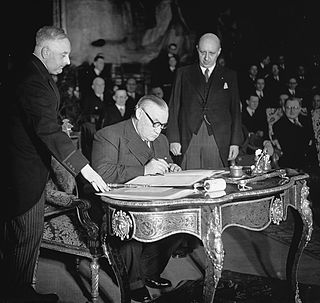
The Treaty of Brussels, also referred to as the Brussels Pact, was the founding treaty of the Western Union (WU) between 1948 and 1954, when it was amended as the Modified Brussels Treaty (MTB) and served as the founding treaty of the Western European Union (WEU) until its termination in 2010. The treaty provided for the organisation of military, economic, social and cultural cooperation among member states as well as a mutual defence clause.
The European School, Brussels II is one of thirteen European Schools in the European Union (EU), and of four in Brussels. It is situated on Avenue Oscar Jespers, in the Brussels suburb of Woluwe-Saint-Lambert.

The European School, Brussels I (ESB1) is a European School located in Uccle, Brussels, Belgium, and Forest, Brussels, Belgium. Originally the second of the European Schools to be founded, the European School, Brussels I, is today one of four in Brussels, and thirteen such schools across the European Union (EU). It is an all-through school, which exists primarily to provide an education to children of EU staff and officials based in Brussels leading to the European Baccalaureate as their secondary leaving qualification. Its alumni include the President of the European Commission, Ursula von der Leyen, and Boris Johnson.
The European School, Luxembourg II (ESL2) is a European School, located on the border of the communes of Bertrange and Mamer in Luxembourg. Founded in 2004, the school prioritises, for enrolment purposes, pupils of EU staff based nearby. It is an all-through school, which offers a multilingual, multicultural education to its pupils, leading to the European Baccalaureate as its secondary leaving qualification.
The Europa School UK is an all-through, free school and IB world school located in Culham near Abingdon in Oxfordshire. It was founded in 2012 by stakeholders of the European School, Culham and subsumed the former school's campus upon its closure in 2017. It now offers the International Baccalaureate Diploma Programme and Middle Years Programme in the secondary section and a bilingual curriculum in primary with English and one of German, French or Spanish. From its foundation until 31 August 2021, it was the only Accredited European School in the United Kingdom. This status was lost due to Brexit.
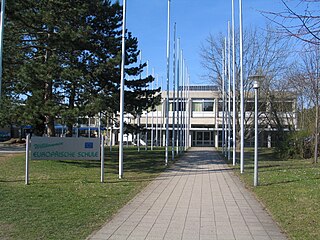
The European School Karlsruhe, commonly known as ESK, is one of three European Schools in Germany and one of thirteen across the European Union (EU). Founded in 1962, the school prioritises, for enrolment purposes, the children of staff of the European Commission's Joint Research Centre for Nuclear Safety and Security based nearby. Children of non-EU staff may enrol provided there is capacity. ESK is an all-through school catering for nursery, primary and secondary pupils, culminating in the awarding of the European Baccalaureate as its secondary leaving qualification.

The Western Union (WU), also referred to as the Brussels Treaty Organisation (BTO), was the European military alliance established between France, the United Kingdom (UK) and the three Benelux countries in September 1948 in order to implement the Treaty of Brussels signed in March the same year. Under this treaty the signatories, referred to as the five powers, agreed to collaborate in the defence field as well as in the political, economic and cultural fields.

The European School The Hague, or ESH is an Accredited European School offering nursery, primary and secondary education in 13 European languages, leading to the European Baccalaureate.
The European School, Brussels III is one of the thirteen European Schools and one of the four located in Brussels. Founded in 1999, it is located in the Brussels municipality of Ixelles (Elsene). The school combines nursery, primary and secondary education, with 3,097 students enrolled at the start of the 2018–2019 academic year, spread over seven language sections. The school priotises the children of European Union (EU) staff for enrolment purposes, with others able to enrol provided there is capacity. Transport links to the school campus include Delta station and Hankar station which provides metro, bus and suburban rail services.
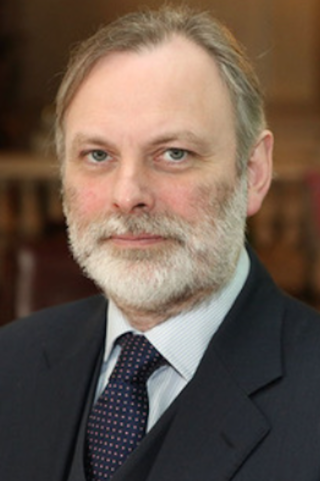
Sir Timothy Earle Barrow is a British diplomat who served as Permanent Representative of the United Kingdom to the European Union from 2017 to 2020 and as the British Ambassador to the European Union from 2020 to 2021. He served as National Security Adviser from 2022 to 2024.

The European School of Strasbourg, or EES, is a public Accredited European School in Strasbourg, France. Founded in 2008, it is an all-through school, which offers a multicultural and multilingual education leading to the European Baccalaureate as its secondary leaving qualification.

The European School of Bruxelles-Argenteuil, also known as the EEBA, is a private, Accredited European School located on the grounds of the Château d'Argenteuil, in Waterloo, Wallonia, Belgium. Founded in 2016, the EEBA is a partnership between Brussels private school Lycée Molière, and the Scandinavian School of Brussels (SSB). The EEBA, through its partnership with the SSB, offers its students the International Baccalaureate as its secondary leaving qualification, with plans to also offer the European Baccalaureate in the near future. The school caters to nursery, primary and secondary students and is equipped with facilities for boarders aged 15 and up.

The European Schools is an intergovernmental organisation, which has established, financed, and administered a small group of multilingual international schools, bearing the title "European School", which exist primarily to offer an education to the children of European Union (EU) staff; offers accreditation to other schools, bearing the title "Accredited European School", under national jurisdiction within EU member states to provide its curriculum; and oversees the provision of the secondary school leaving diploma, the European Baccalaureate.















